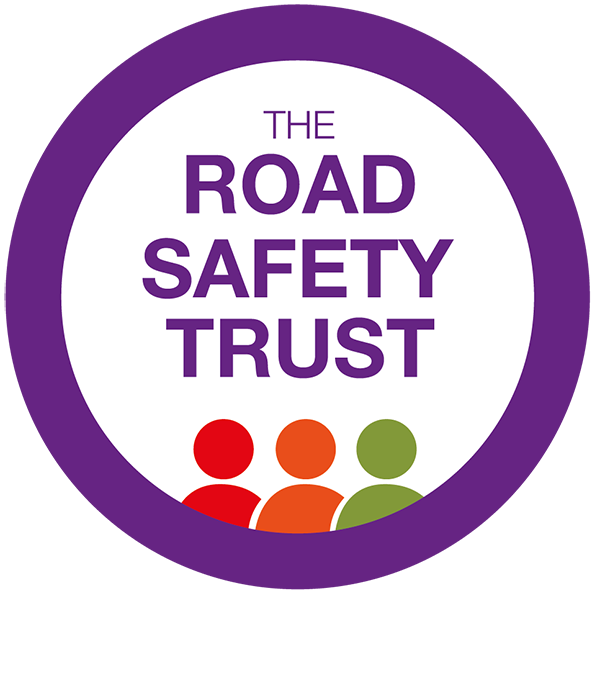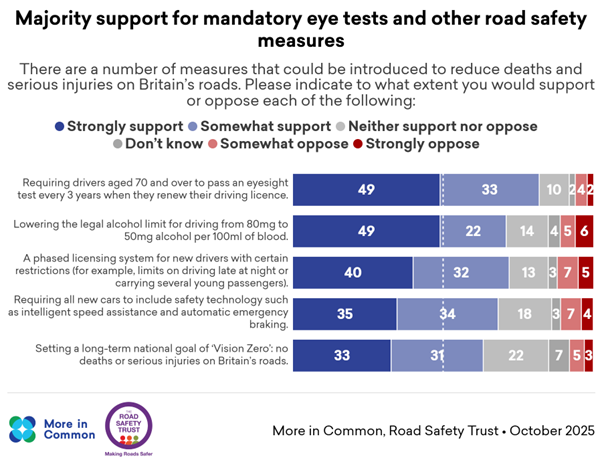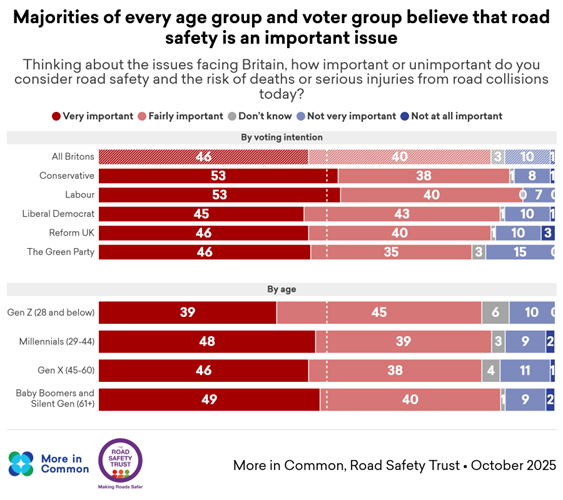British public backs further policies to make roads safer, new research shows
New polling shows widespread public support for many of the reported policies being considered by the government in its upcoming Road Safety Strategy - and appetite for further road safety legislation to protect young drivers.
Unveiling the findings at the annual UKROEd/NPCC Roads Policing Conference today (Wednesday 22 October), Paul Steinberg, Director of Communications and Engagement at The Road Safety Trust, said the research demonstrates that the British public are ready for stronger action to make our roads safer.
Commissioned by the Trust and conducted by More in Common, the survey explores public attitudes towards key road safety measures, ahead of the Government’s forthcoming National Road Safety Strategy – the first such strategy in a generation.
The majority of Britons support a range of policy measures:
Four in five (82 per cent) support mandatory eyesight tests for drivers over 70.
72 per cent support the introduction of a phased licensing system for new drivers.
Majorities also back lowering the drink-drive limit (71 per cent), tougher car safety standards (68 per cent), and a ‘Vision Zero’ target of no deaths or serious injuries on the roads (64 per cent).
86 per cent of Britons say road safety is an important issue, spanning all ages and political groups.
48 per cent think too little is being done to protect young drivers, rising to 58 per cent among parents with children over the age of 16.
Paul Steinberg, Director of Communications and Engagement at The Road Safety Trust, said: “This research shows that the British public have confidence in evidence-based measures to reduce deaths and serious injuries on our roads - and want to see them implemented.
“For years, we have understood from experience and evaluation what works to make roads safer. What is new today is clear, nationwide evidence that the public supports those same measures. More in Common’s findings come at an important moment, as the Government prepares to publish its long-awaited National Road Safety Strategy. They show a willing public and clear opportunity for action.”
Alex Newton, Deputy Director of Strategy and Development at More in Common, added: “We’re used to working on issues that divide public opinion. Road safety stands out as an issue where there’s a strong level of consensus.
"While support for certain policies varies by age, Britons across generations and voter groups want stronger action to make our roads safer and hold high expectations of the government on this issue.”
Strong public support for road safety measures
Ahead of the government’s upcoming road safety strategy, Britons express strong support for a range of measures reportedly being considered:
Mandatory eyesight tests for drivers over 70 - supported by 82 per cent and opposed by 6 per cent.
Lowering the legal alcohol limit - supported by 71 per cent, opposed by 11 per cent.
Requiring all new cars to include safety technology such as intelligent speed assistance and automatic emergency braking - supported by 68 per cent, opposed by 11 per cent.
There is also majority support for Graduated Driver Licensing (GDL), a phased licensing policy for young drivers that the government is believed not to include in the road safety strategy. 72 per cent support this, while 12 per cent oppose it.
Most Britons would also support a ‘Vision Zero’ target of no deaths or serious injuries - supported by 64 per cent, opposed by 8 per cent.
Many Britons want greater protection for young drivers
Almost half of Britons (48 per cent) think too little is being done to reduce the risks faced by young drivers, rising to 58 per cent among parents of children aged 16 or older.
Younger people themselves are less likely to share this concern: only 27 per cent of 18–24-year-olds believe too little is being done, while a majority (54 per cent) think enough is already being done.
Road safety is a shared national concern
More than four in five Britons (86 per cent) say road safety is an important issue facing the country.
Concern is high across political groups, with majorities in every voter group saying it is an important issue - highest among Labour supporters (93 per cent).
Concern is also consistent across age groups, from 85 per cent of Gen Z Britons to 89 per cent of those aged over 60.
The full research dataset can be accessed via the following link:
Polling was undertaken by More in Common using an online panel. Fieldwork was carried out between 3 and 6 October 2025. The sample size was 2,003 (nationally representative sample of GB adults).
22 October 2025



